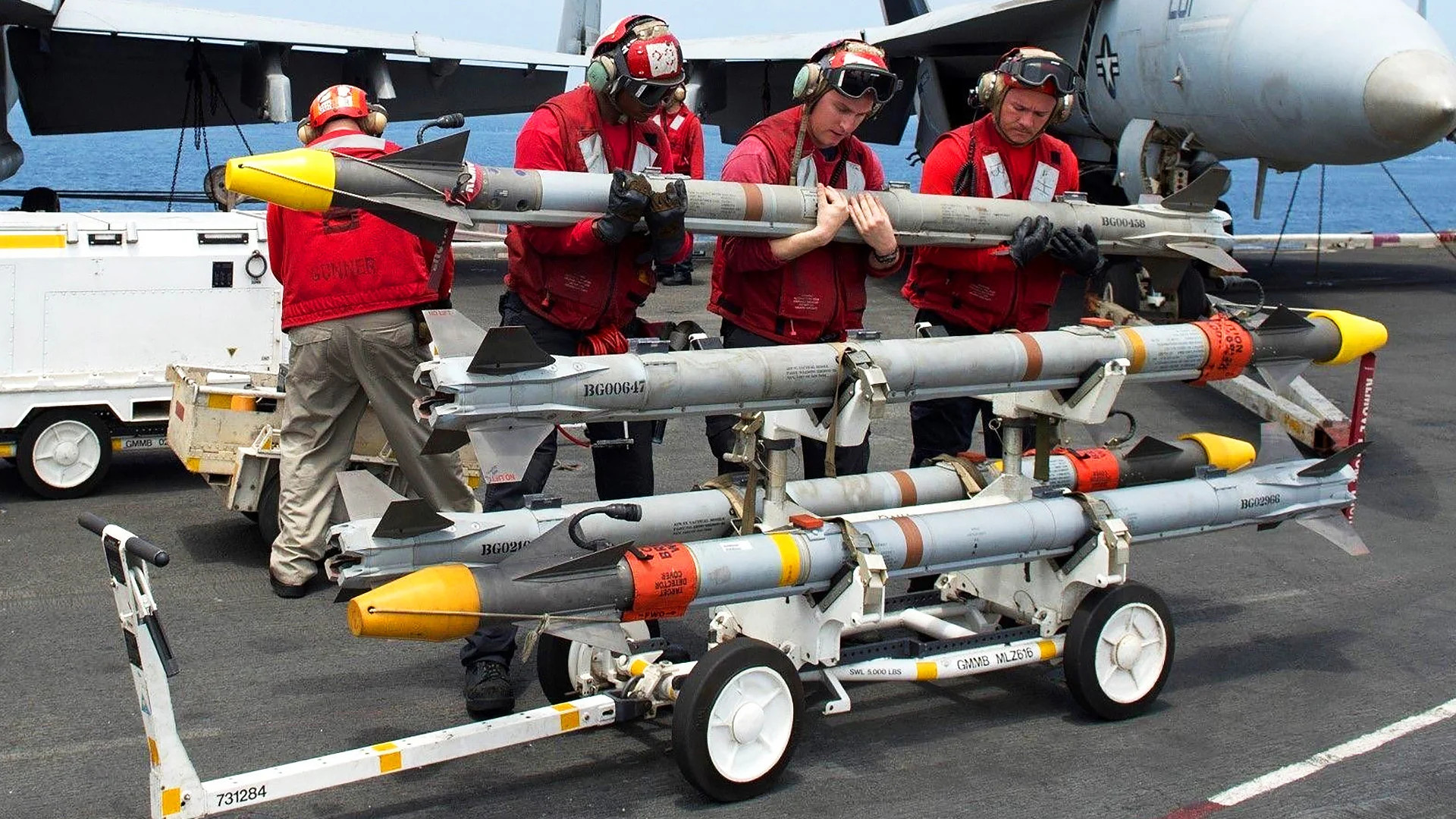U.S. Navy EA-18G Growler electronic warfare aircraft can now carry AIM-9X Sidewinders under their wings. As part of the same process, the service has cleared AIM-9Xs to go on pylons underneath the wings of its F/A-18E/F Super Hornets, expanding the total number of Sidewinders those jets can carry on a single sortie. The Navy took these steps specifically to help give Super Hornets and Growlers flying over and around the Red Sea more options to engage Houthi drones.
Navy Rear Admiral Stephen Tedford, head of Naval Air Systems Command’s (NAVAIR) Program Executive Office for Unmanned Aviation and Strike Weapons, or PEO (U&W), disclosed the new details regarding AIM-9X on Growler and Super Hornet at the Navy League’s annual Sea Air Space conference yesterday.

PEO (U&W), together with NAVAIR’s Naval Air Warfare Center Aircraft Division (NAWCAD), worked on “an accelerated path to generate a flight clearance that allows us to carry the AIM-9X on inboard stations on the F/A-18[E/F Super Hornet]. So, instead of just being limited to two, they’re now carrying four,” Tedford explained. “That also allows us to carry them on Growler.”

Tedford’s reference to “inboard stations” in this instance simply appears to reflect that Navy Super Hornets were previously only cleared to carry AIM-9X on their wingtip stations. There is no indication that the service’s Super Hornets, or Growlers, are now able to carry Sidewinders under their wings anywhere beyond the two most outboard stations (stations 2 and 10). The War Zone has reached out to NAVAIR for more information.
It is worth noting that Royal Australian Air Force (RAAF) EA-18Gs are already capable of carrying AIM-9Xs on their outboard wing stations. This was originally an Australia-specific requirement for Growler, along with the ability to carry the Advanced Targeting Forward-Looking Infrared (ATFLIR) pod. However, the Navy supported that integration effort, which can only have helped the service speed up the process of clearing its own Growlers to carry AIM-9Xs on those same wing stations.

When it comes to carrying AIM-9Xs on the EA-18G, this clearance is key. Though it is a Super Hornet variant, the Growler’s wingtips are occupied by pods associated with the aircraft’s built-in AN/ALQ-218(V)2 electronic warfare suite. The loadout for the Navy’s Growlers has typically consisted of three external electronic warfare pods, one under each wing and another on the centerline, along with two underwing drop tanks and a pair of AIM-120 Advanced Medium Range Air-to-Air Missiles (AMRAAM) on the jet’s fuselage stations outboard of its engine intakes. In Navy service, these jets also often carry radar-busting AGM-88E Advanced Antiradiation Guided Missiles (AARGM) on their outboard wing stations.

Getting AIM-9X on Navy Growlers and increasing the number of those missiles a single one of the service’s F/A-18E/Fs can carry together represented “a critical need … in support of [operations in and around the] Red Sea,” according to Rear Admiral Tedford. Doing this “gave us a lot more firepower and capability immediately in support of Red Sea operations and counter-UAS [uncrewed aerial systems].”
Since October 2023, Iranian-backed Houthi militants in Yemen have been launching drones, as well as ballistic and cruise missiles, at U.S. and other foreign warships, as well as commercial vessels, in and around the Red Sea. Navy Super Hornets have shot down Houthi drones in the course of operations in the region over the past six months or so, as The War Zone was among the first to report, but it is unknown what weapons they have used to do so. Super Hornets, as well as Growlers, have also been part of force packages used to strike Houthi targets ashore in Yemen.

Growlers and Super Hornets could also use their AIM-9Xs, in some circumstances, to engage Houthi cruise missiles. The War Zone has reached out to the Navy for more details on the Sidewinder’s use against Houthi threats.
The new developments regarding AIM-9X on Growler and Super Hornet are relevant beyond the current crisis in and around the Red Sea, too. The Navy faces an ever-growing array of drone and cruise missile threats from state and non-state actors, which is already prompting the service to install additional layers of protection on its ships. The need for added defenses against hostile swarms of drones and large barrages of cruise missiles, among other threats, are particularly significant issues for the Navy as it prepares for future higher-end conflicts, especially a potential one in the Pacific against China.

In turn, the ability of Growlers to carry Sidewinders, and for Super Hornets to carry more of them, offers additional defensive flexibility going forward for carrier strike groups and other forces these aircraft might be tasked to support. For Growler, AIM-9Xs just offer the jets useful additional self-defense capability that has unique close-range capabilities compared to the AIM-120, including the ability to make helmet mounted display-cued shots far off the jet’s centerline at close ranges. This capability is also useful for engaging drones that have been intercepted.
So, spurred by the activities over and near the Red Sea, the Navy’s Super Hornet fleet now has new options when it comes to carrying AIM-9Xs, especially for use against the expanding and evolving threat posed by drones, and the service’s Growlers just gained a valuable new weapon.
UPDATE: 5/15/2024 —
Naval Air Systems Command (NAVAIR) has reached out to clarify that while Navy EA-18G Growlers are being used in flight testing to clear the carriage of AIM-9Xs on their outboard underwing stations, this has been in support of Royal Australian Air Force requirements. U.S. Growlers are not currently cleared to carry those weapons themselves.
As has since been seen in operational use, Navy F/A-18E/F Super Hornets are now capable of carrying AIM-9Xs on stations two and 10, as well as one and 11.
Contact the author: joe@twz.com
